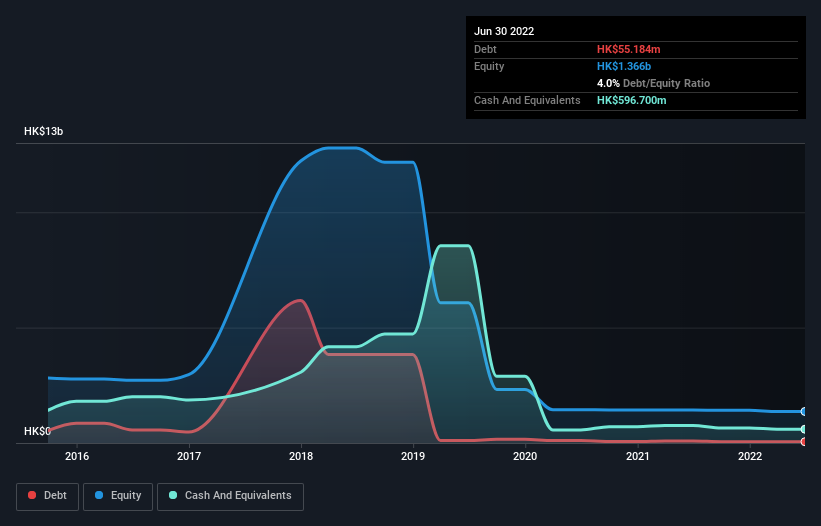
David Iben put it well when he said, 'Volatility is not a risk we care about. What we care about is avoiding the permanent loss of capital.' When we think about how risky a company is, we always like to look at its use of debt, since debt overload can lead to ruin. We note that Tysan Holdings Limited (HKG:687) does have debt on its balance sheet. But is this debt a concern to shareholders?
When Is Debt Dangerous?
Debt is a tool to help businesses grow, but if a business is incapable of paying off its lenders, then it exists at their mercy. Part and parcel of capitalism is the process of 'creative destruction' where failed businesses are mercilessly liquidated by their bankers. While that is not too common, we often do see indebted companies permanently diluting shareholders because lenders force them to raise capital at a distressed price. Having said that, the most common situation is where a company manages its debt reasonably well - and to its own advantage. The first step when considering a company's debt levels is to consider its cash and debt together.
See our latest analysis for Tysan Holdings
What Is Tysan Holdings's Debt?
As you can see below, Tysan Holdings had HK$55.2m of debt at June 2022, down from HK$90.0m a year prior. However, it does have HK$596.7m in cash offsetting this, leading to net cash of HK$541.5m.

A Look At Tysan Holdings' Liabilities
According to the last reported balance sheet, Tysan Holdings had liabilities of HK$479.3m due within 12 months, and liabilities of HK$74.0m due beyond 12 months. Offsetting these obligations, it had cash of HK$596.7m as well as receivables valued at HK$857.2m due within 12 months. So it can boast HK$900.7m more liquid assets than total liabilities.
This surplus strongly suggests that Tysan Holdings has a rock-solid balance sheet (and the debt is of no concern whatsoever). On this view, lenders should feel as safe as the beloved of a black-belt karate master. Succinctly put, Tysan Holdings boasts net cash, so it's fair to say it does not have a heavy debt load! There's no doubt that we learn most about debt from the balance sheet. But you can't view debt in total isolation; since Tysan Holdings will need earnings to service that debt. So if you're keen to discover more about its earnings, it might be worth checking out this graph of its long term earnings trend.
Over 12 months, Tysan Holdings made a loss at the EBIT level, and saw its revenue drop to HK$2.1b, which is a fall of 22%. That makes us nervous, to say the least.
So How Risky Is Tysan Holdings?
While Tysan Holdings lost money on an earnings before interest and tax (EBIT) level, it actually booked a paper profit of HK$5.0m. So taking that on face value, and considering the cash, we don't think its very risky in the near term. There's no doubt the next few years will be crucial to how the business matures. There's no doubt that we learn most about debt from the balance sheet. But ultimately, every company can contain risks that exist outside of the balance sheet. Be aware that Tysan Holdings is showing 1 warning sign in our investment analysis , you should know about...
At the end of the day, it's often better to focus on companies that are free from net debt. You can access our special list of such companies (all with a track record of profit growth). It's free.
Valuation is complex, but we're here to simplify it.
Discover if Tysan Holdings might be undervalued or overvalued with our detailed analysis, featuring fair value estimates, potential risks, dividends, insider trades, and its financial condition.
Access Free AnalysisHave feedback on this article? Concerned about the content? Get in touch with us directly. Alternatively, email editorial-team (at) simplywallst.com.
This article by Simply Wall St is general in nature. We provide commentary based on historical data and analyst forecasts only using an unbiased methodology and our articles are not intended to be financial advice. It does not constitute a recommendation to buy or sell any stock, and does not take account of your objectives, or your financial situation. We aim to bring you long-term focused analysis driven by fundamental data. Note that our analysis may not factor in the latest price-sensitive company announcements or qualitative material. Simply Wall St has no position in any stocks mentioned.
About SEHK:687
Tysan Holdings
An investment holding company, provides foundation piling and site investigation services in Hong Kong.
Excellent balance sheet with acceptable track record.
Market Insights
Community Narratives



